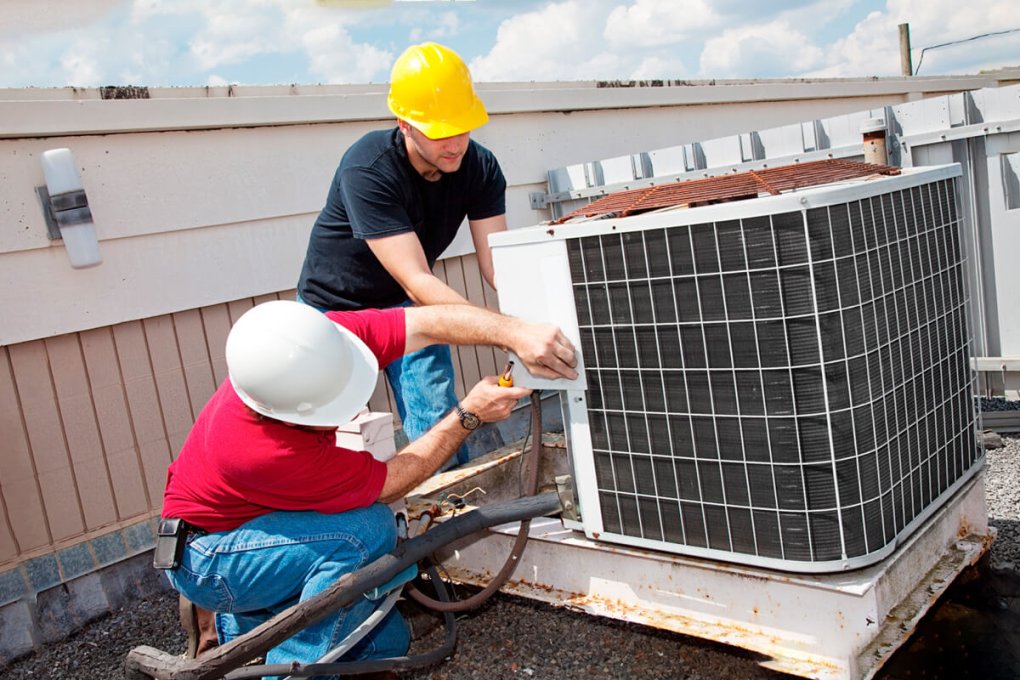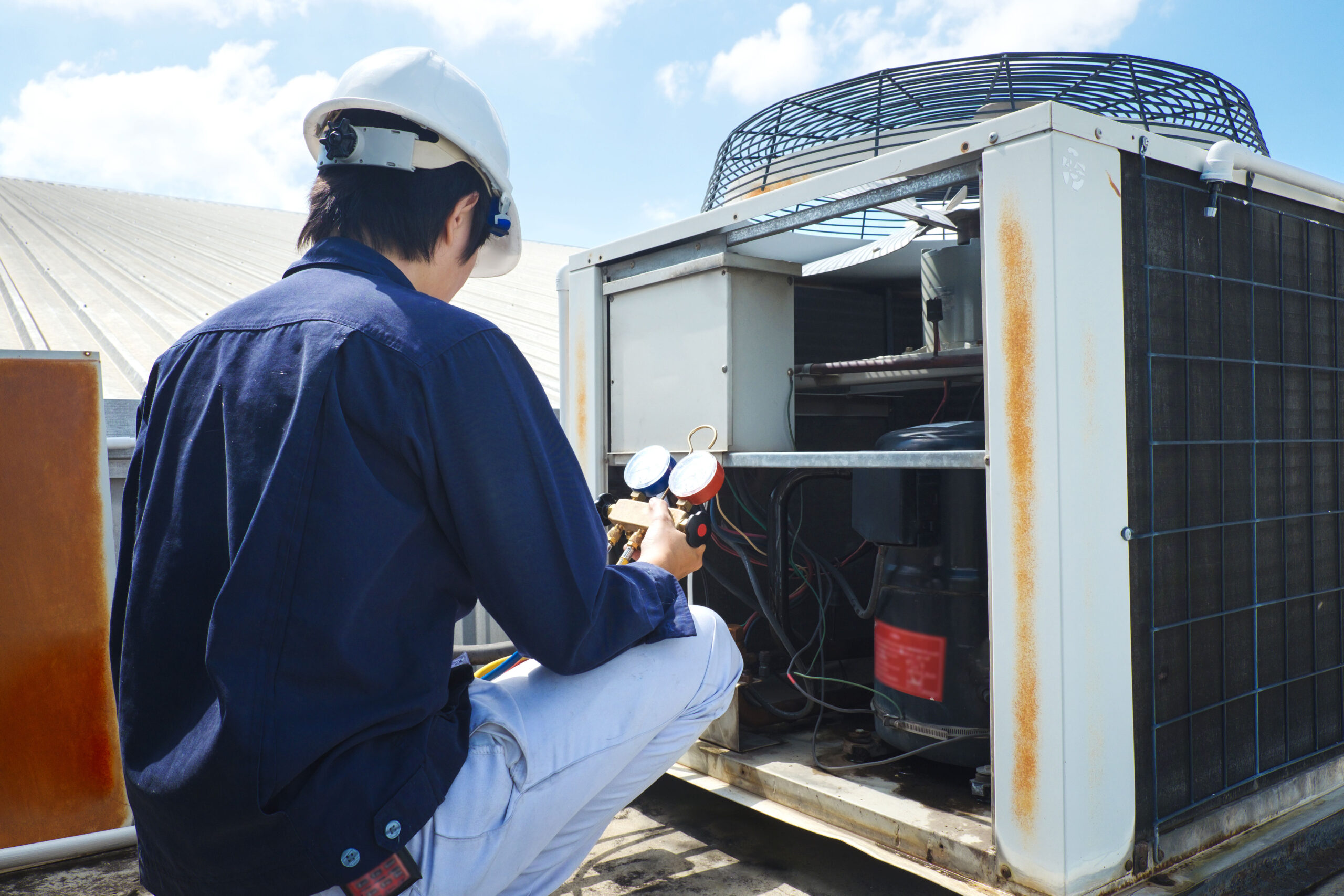Menu

Ensure your HVAC system remains in top condition with our comprehensive maintenance services in Riverside and San Bernardino County. With a focus on preventive care, we offer two maintenance calls each year – one for the heating season and one for the cooling season. Our goal is to inspect your system thoroughly, advise you of any necessary repairs (with no repairs made without your approval), and prevent breakdowns while maintaining efficiency. During our inspections.
21 POINT INSPECTION FOR COOLING
1. Inspect and rinse the outdoor unit: The outdoor unit can become clogged with debris, which can reduce the system’s efficiency and cause it to work harder than it needs to.
2. Check the thermostat calibration: If the thermostat is not calibrated correctly, it can cause the system to run longer than it needs to, resulting in higher energy bills.
3. Inspect the indoor blower: A dirty blower can reduce the airflow, can ice up, burn motor and compressor.

The outdoor unit can become clogged with debris, which can reduce the system’s efficiency and cause it to work harder than it needs to.
If the thermostat is not calibrated correctly, it can cause the system to run longer than it needs to, resulting in higher energy bills.
A dirty blower can reduce the airflow, can ice up, burn motor and compressor.
A low refrigerant charge can cause the system to work harder than necessary, freeze and leading to higher energy bills.
(washing existing filter included, customer needs to provide new filter) A dirty air filter can reduce the airflow.
A dirty evaporator coil can freeze and cause water damage and leading to higher energy bills.
A dirty condenser coil can reduce the system’s efficiency and cause it to work harder than necessary, leading to higher energy bills.
Loose connections can cause the system to work harder than necessary, leading to higher energy bills.
Misaligned or worn blower components can reduce the airflow and cause the system to work harder than necessary.
Loose belts and pulleys can cause the system to work harder than necessary, leading to higher energy bills.
A clogged condensate drain can cause the system to shut down, leading to higher energy bills and potential water damage.
Incorrect fan blade pitch can reduce the airflow and cause the system to work harder than necessary.
Malfunctioning safety controls can cause the system to shut down, leading to higher energy bills and potential safety hazards.
Malfunctioning thermostats can cause the system to run longer than necessary, resulting in higher energy bills.
Faulty capacitors can cause the system to run longer than necessary, resulting in higher energy bills.
Faulty contactors can cause the system to shut down or run longer than necessary, leading to higher energy bills.
The temperature differential.
Malfunctioning high-pressure switches can cause the system to shut down, leading to higher energy bills and potential safety hazards.
Malfunctioning low-pressure switches can cause the system to shut down, leading to higher energy bills and potential safety hazards.
Damaged insulation can cause the system to work harder than necessary, leading to higher energy bills.
Spots and leaks.

test
Dirty burners can cause incomplete combustion, which can reduce the system’s efficiency and potentially produce harmful gases.
A dirty or damaged heat exchanger can reduce the system’s efficiency and potentially produce harmful gases.
Incorrect gas pressure can cause the system to work harder than necessary, leading to higher energy bills.
A clogged flue pipe can cause the system to shut down or potentially produce harmful gases.
(cleaning is extra) A dirty blower wheel and housing can reduce the airflow and cause the system to work harder than necessary.
(Customer provided) A dirty air filter can reduce the airflow and cause the system to work harder than necessary
Loose connections can cause the system to work harder than necessary, leading to higher energy bills.
Lack of lubrication can cause the blower motor to work harder than necessary, leading to higher energy bills and potentially shortening the motor’s lifespan.
Loose belts and pulleys can cause the blower to work harder than necessary, leading to higher energy bills.
Incorrect blower speed can reduce the airflow and cause the system to work harder than necessary.
A dirty or malfunctioning pilot assembly can cause the system to shut down or produce harmful gases.
Malfunctioning thermocouples can cause the system to shut down or produce harmful gases.
Malfunctioning safety controls can cause the system to shut down or potentially produce harmful gases.
Malfunctioning limit switches can cause the system to shut down or potentially produce harmful gases.
Faulty ignition systems can cause the system to shut down or produce harmful gases.
A clogged intake can reduce the airflow and cause the system to work harder than necessary.
Incorrect flue draft can cause the system to shut down or potentially produce harmful gases.
Incorrect gas valve settings can cause the system to work harder than necessary, leading to higher energy bills.
Leaks and damage can reduce the airflow and cause the system to work harder than necessary.
Damaged insulation can cause the system to work harder than necessary, leading to higher energy bills.
Oil spots and leaks.
7. Inspect and tighten electrical connections: Loose connections can cause the system to work harder than necessary, leading to higher energy bills.
8. Lubricate the blower motor and bearings: Lack of lubrication can cause the blower motor to work harder than necessary, leading to higher energy bills and potentially shortening the motor’s lifespan.
9. Inspect and tighten the belts and pulleys: Loose belts and pulleys can cause the blower to work harder than necessary, leading to higher energy bills.
10. Check and adjust the blower speed: Incorrect blower speed can reduce the airflow and cause the system to work harder than necessary.
11. Inspect and clean the pilot assembly: A dirty or malfunctioning pilot assembly can cause the system to shut down or produce harmful gases.
12. Inspect and test the thermocouple: Malfunctioning thermocouples can cause the system to shut down or produce harmful gases.
13. Inspect and test the safety controls: Malfunctioning safety controls can cause the system to shut down or potentially produce harmful gases.
14. Inspect and test the limit switch: Malfunctioning limit switches can cause the system to shut down or potentially produce harmful gases.
15. Check and test the ignition system: Faulty ignition systems can cause the system to shut down or produce harmful gases.
16. Inspect and clean the combustion air intake: A clogged intake can reduce the airflow and cause the system to work harder than necessary.
17. Inspect and test the flue draft: Incorrect flue draft can cause the system to shut down or potentially produce harmful gases.
18. Check and adjust the gas valve: Incorrect gas valve settings can cause the system to work harder than necessary, leading to higher energy bills.
19. Check the ductwork for leaks and damage: Leaks and damage can reduce the airflow and cause the system to work harder than necessary.
20. Check the insulation on the ductwork: Damaged insulation can cause the system to work harder than necessary, leading to higher energy bills.
21. Check for oil spots and leaks.
